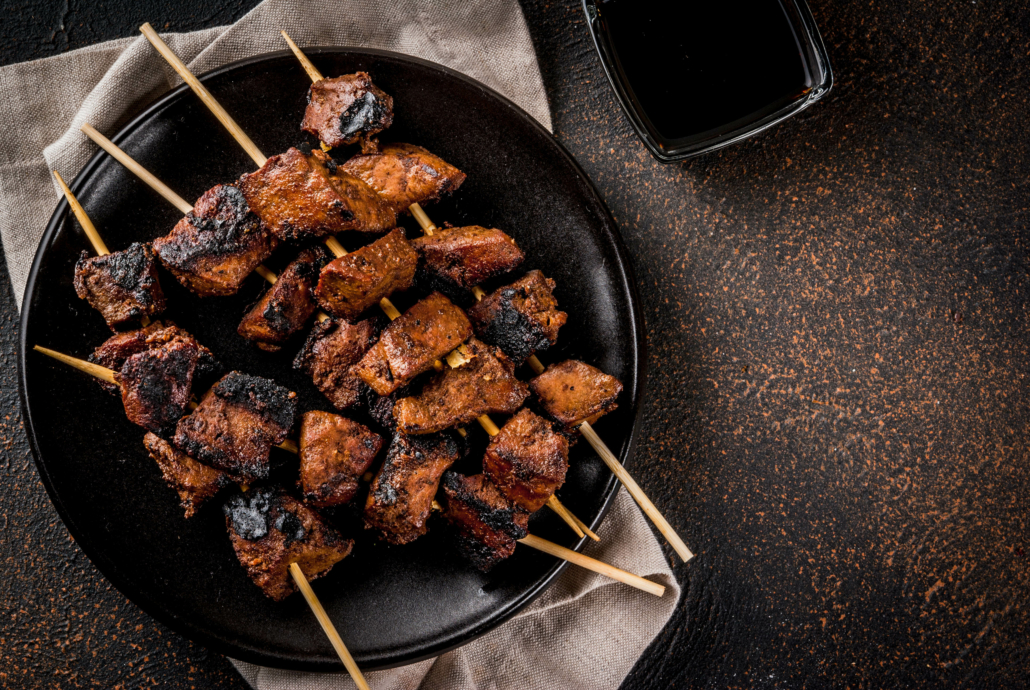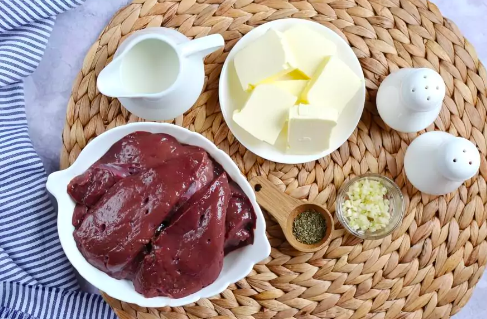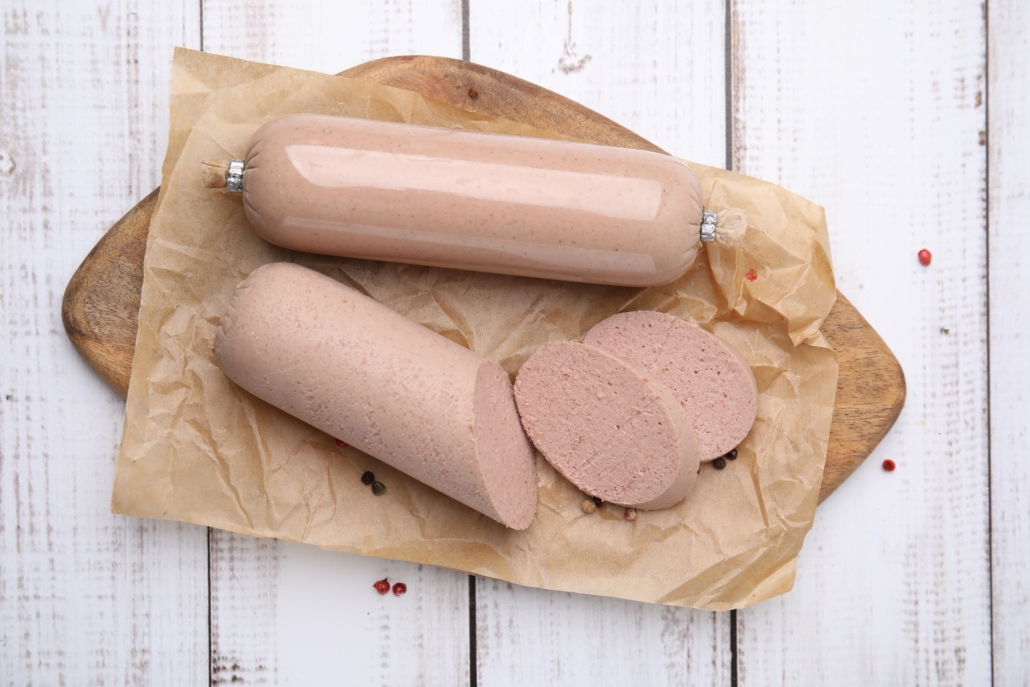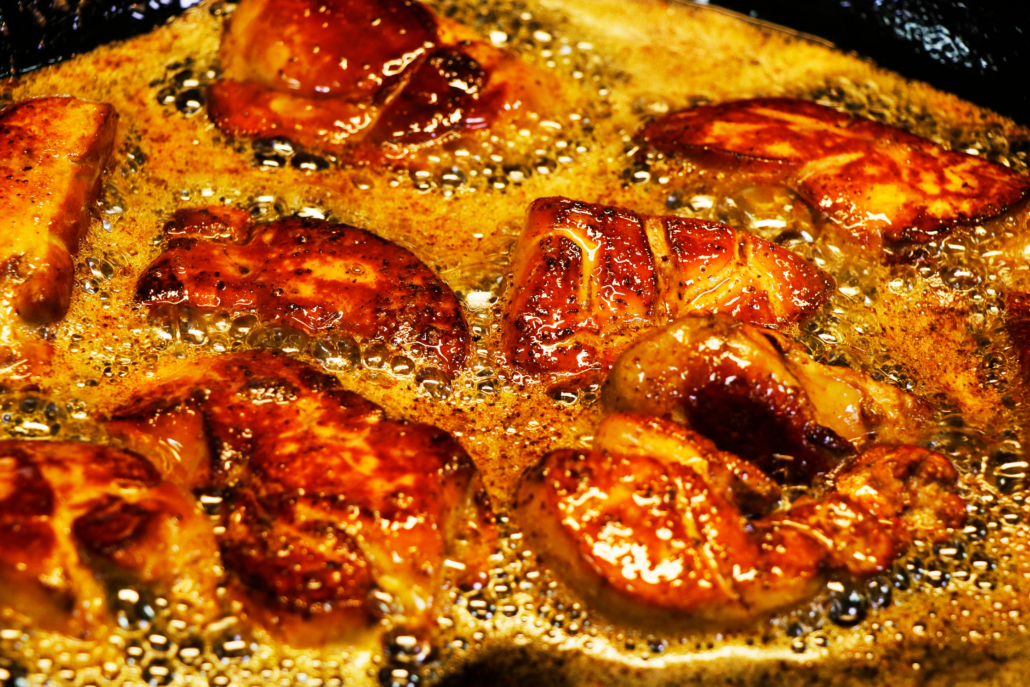We include products in articles we think are useful for our readers. If you buy products or services through links on our website, we may earn a small commission.
Goat Liver: Nutrition, Benefits, and Low-Carb Recipes
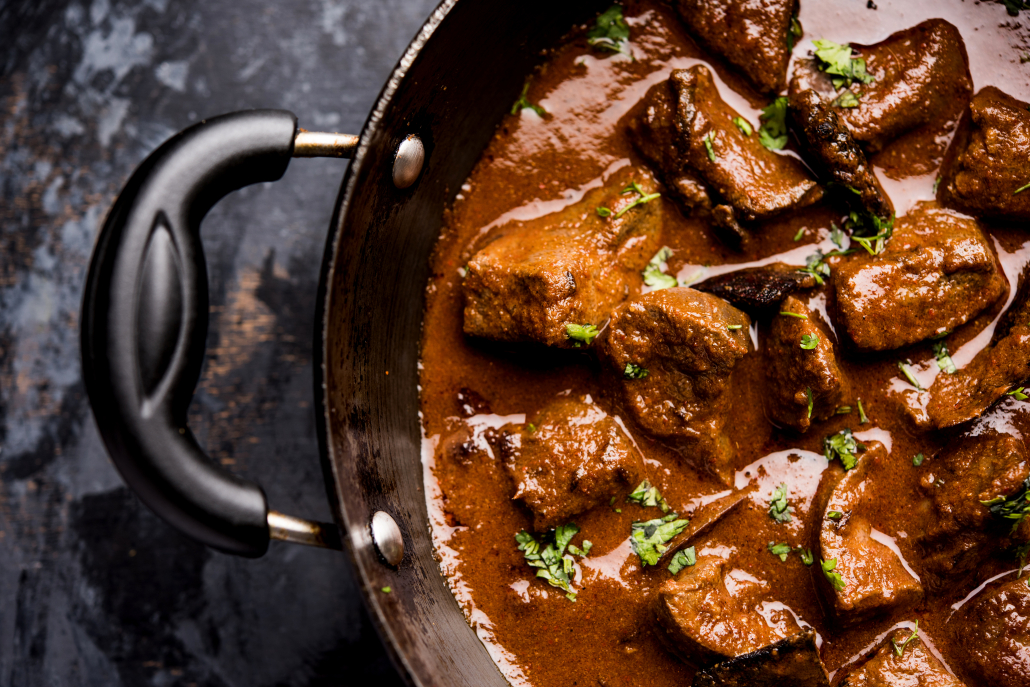
Table of Contents
In this article, we’ll explore goat liver nutrition, its health benefits, and offer a few tasty low-carb goat liver recipes.
Goat (AKA Mutton) liver may not be the first food you think of when you’re hungry, or even the first organ meat superfood that comes to mind for nose-to-tail eating aficionados.
But it is more approachable (and tastier) than you’d think! Goat liver offers many of the same amazing health benefits you’ve come to expect of beef or chicken liver — and even a few distinctive benefits of its own.
Time to dig in.
What is Goat Liver?
Goat liver is the liver of a young male or female goat, in this context specifically eaten and enjoyed as food. It’s also called Mutton liver, and common in areas where goats (as opposed to cows) are relied on to feed the population.
Mutton is a staple food in India, Africa, Australia, the Middle East, Central and South America, and New Zealand. Goat liver’s culture-by-culture popularity is reflected by the presence of curry spice or nutmeg in many of the best recipes.
Ironically, many populations that suffer from food scarcity often get the unexpected benefits of goat liver since they have to rely on inexpensive organ meats to get adequate calories.
In recent years the popularity of goat’s milk, goat meat, and other goat-derived products has spread to the US.
Goat meat is especially popular in Texas — 44% of the U.S.’s three milllion-plus goats call the Lone Star State their home. A growing number of farmers are realizing that goats are more environmentally friendly and easier to feed than cattle. [1]
Goat Liver Nutrition
Like many other types of liver, goat liver contains unusually high amounts of vital vitamins and minerals like vitamin B12, iron, and vitamin A.
Goat Liver Nutrition: Macronutrients
| 3 OUNCES GOAT LIVER (85G) | |
| TOTAL CALORIES | 135 |
| TOTAL FAT | 3.6 grams |
| SATURATED FAT | 2.1 grams |
| TRANS FAT | 0.0 grams |
| CHOLESTEROL | 302 milligrams |
| SODIUM | 0 milligrams |
| POTASSIUM | 258 milligrams |
| CARBOHYDRATES | 3.1 grams |
| NET CARBS | 3.1 grams |
| SUGAR | 0 grams |
| PROTEIN | 20.4 grams |
Fat
Goat liver is predictably low in fat. Most of the fat it does have is anti-inflammatory and highly saturated. [2]
You can thank goat’s status as a ruminant animal for that — goats and other ruminants can convert the ‘bad’ fats they eat into ‘good’ fats that benefit us when we eat them. [3]
Protein
Goat liver is also a great source of protein. Just a modest 3oz serving of liver contains the 20+ grams you need to max out protein synthesis. [4] This protein comes in a truly complete format featuring all 9 essential amino acids. [5]
Carbohydrates
Mutton liver contains small amounts of carbs, especially if it’s still fresh. 3 ounces of liver contains between 3-4 grams of carbohydrates. But don’t worry about this interfering with your keto or carnivore diet, as you can eat plenty of liver and still stay in ketosis.
Goat Liver Nutrition: Micronutrients
| NUTRIENT | 3 OUNCES GOAT LIVER (85G) | %RDV |
| IRON | 4.9 milligrams | 62% |
| MAGNESIUM | 18 milligrams | 6% |
| PHOSPHORUS | 387 milligrams | 39% |
| ZINC | 4 milligrams | 27% |
| COPPER | 9.8 milligrams | 488% |
| THIAMIN | 0.2 milligrams | 13% |
| RIBOFLAVIN (B2) | 2.8 milligram | 163% |
| NIACIN | 13.2 milligrams | 66% |
| FOLATE | 290 micrograms | 73% |
| VITAMIN B6 | 1 milligrams | 84% |
| VITAMIN B12 | 59.3 micrograms | 2471% |
B12
3 ounces of goat liver contains a whopping 24 times your daily B12 RDV. This type of megadose can lead to serious improvements in energy levels, mental health, and more. B12’s other benefits include: [6]
- More efficient cell division
- Increased energy (ATP) generation
- Faster carbohydrate and fat metabolism
- Healthier nervous system (CNS) function
Iron
Goat liver is a great source of heme iron, a variety that is far more bioavailable than the iron you find in plant based foods.
Just 100 grams of goat liver contains enough iron for most males to hit their RDV (the RDV for menstruating women is higher).
Liver is so high in iron that it was used by Nobel prize winner Dr. George Minot to cure patients from iron-deficiency anemia. “If patients ate abundant amounts of liver daily, their condition improved,” Minot and his colleagues noted. This ‘liver treatment’ was popular throughout the 1930s before newer, more easily-patented cures took over. [7]
Goat liver’s iron content is also helpful for pregnant women, who need more heme iron than usual. [8]
Copper
Goat liver is also a good source of copper. In fact, it’s so high in copper that if you eat it too often your body’s copper:zinc ratio can become unbalanced.
Eaten once a week, however, goat liver’s copper content contributes to a variety of important physiological functions: [9]
- Connective tissue regeneration
- Energy (ATP) generation
- Nervous system function
- Hair maintenance (strength, sheen etc)
- Antioxidant production
Goat liver’s other nutrients
The above three nutrients may be goat liver’s highlights, but they’re really just the start. Liver is also a great source of the following:
- Vitamin A
- Riboflavin (B2)
- Niacin (B3)
- Pantothenic acid (B5)
- Pyridoxine (B6)
- Folate (B9)
- Vitamin D
- Phosphorous
- Selenium
- Zinc
Goat Liver Benefits
Better skin
Any skincare enthusiasts reading this will probably be aware of the most popular skincare product of all time: retinol–a derivative of vitamin A.
Retinol has a decades-long track record of improving the skin’s appearance and warding off aging — it’s popular for good reason.
What you might not know is that the vitamin A you ingest can benefit your skin from the inside out. Goat liver is so rich in preformed vitamin A (the most absorbable kind) that many liver lovers report it giving them soft, glowing skin. [10]
More Energy!
Many people find that goat liver provides a noticeable energy rush.
This energy-boosting quality is due to a special blend of B vitamins. Studies dating back to the 1950s show that eating liver can boost endurance and exercise tolerance. [11]
Fast forward to the present day, these same energy-boosting and anti-fatigue factors can help you stay focused and productive throughout your day.
Improves Memory
Goat liver’s blend of cholesterol, B vitamins, and iron, means it’s an incredible brain food.
Many eaters find that both their mood and memory improve for days following a meal of liver.
Given B vitamins improve cellular energy production throughout the brain, this is really no surprise. Getting adequate B12 may also help clear toxic metabolites like homocysteine out of your brain. [12] [13]
A Better Future (We’ll Explain)
This last benefit may sound cryptic, but it’s not.
Studies done in animals have shown that eating liver can positively affect the next generation. If young animals eat liver, they develop into stronger and more robust creatures — and so does the generation after them. [14]
The idea that liver could shift one’s epigenetic health towards a more robust direction is observed in the studies of pioneering diet researcher Weston A. Price, the “Isaac Newton of Nutrition.”. Price found that virtually every ancient culture viewed animal liver as a staple food for pregnant women and young children. [15]
Sourcing Quality Goat Liver
Quality is everything when it comes to consuming goat liver.
The liver of a stressed animal may be slightly higher in residual toxins and lower in important nutrients.
In addition to these tangible nutritional differences, studies in other species suggest that the stress present in an animal can be passed on to the eater in the form of deformed polyamine proteins. In short, eating the liver of stressed, poorly-treated goats isn’t the best choice. [16]
The liver from humanely raised grass-fed goat liver, on the other hand, is a true superfood in every sense of the word.
Ask around at your local farmer’s market, or just consult your techno oracle (Google), to see if there are any goat farmers near you.
If goat liver is unavailable, too inconvenient to cook, or you just can’t warm to the taste, but you still want the robust nutrition benefits, Doctor Kiltz’s beef liver supplements might be the ticket!
Goat Liver Recipe
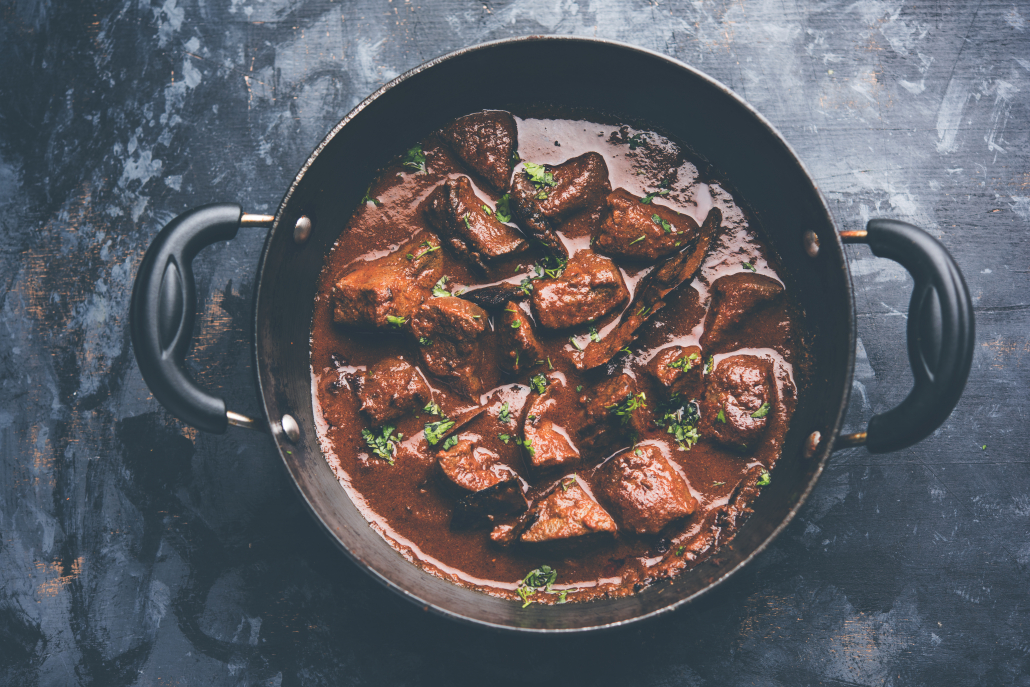
If you’ve read enough to become convinced that this special food is for you, the following recipe should help you reap its nutrition and benefits.
This goat liver recipe transforms what might sound like an intimidating anachronism into a savory dish that the whole family can enjoy.
Goat (Mutton) Liver Fry
Ingredients
- ½ pound goat liver
- Several small onions
- 3 large garlic cloves
- Curry leaves
- 4 long coconut pieces
- 1 tsp cumin seeds
- ½ tsp curry powder
- Salt and pepper to taste
- Ginger to taste
- Cooking fat (ghee works great)
Process
- Wash the liver thoroughly, then cut it into small pieces with kitchen scissors.
- Chop up onions and curry leaves and keep them ready to the side.
- Time to make masala! Add garlic, cumin seeds, pepper, ginger, curry powder, red chili, and coconut into a blender and blend until smooth.
- Add mustard seeds and curry leaves to an oiled pan. Add pepper to taste.
- Once the mustard seeds start ‘sputtering, add your pieces of liver.
- After two minutes, add onion and red chili. Fry until the onions are lightly cooked.
- Add your grounded masala and mix everything together.
- Saute for 2 minutes, then cover with a lid and simmer for 5 minutes.
- Check on the masala periodically. When all the excess water is gone, continue simmering for one minute.
- Add chopped coriander and serve warm.
The Takeaway
Goat liver’s winning combo of abundant nutrients and virtually no antinutrients means it’s one of the most nourishing foods on the planet.
If you can find it, don’t be afraid to try this unique food for yourself!













